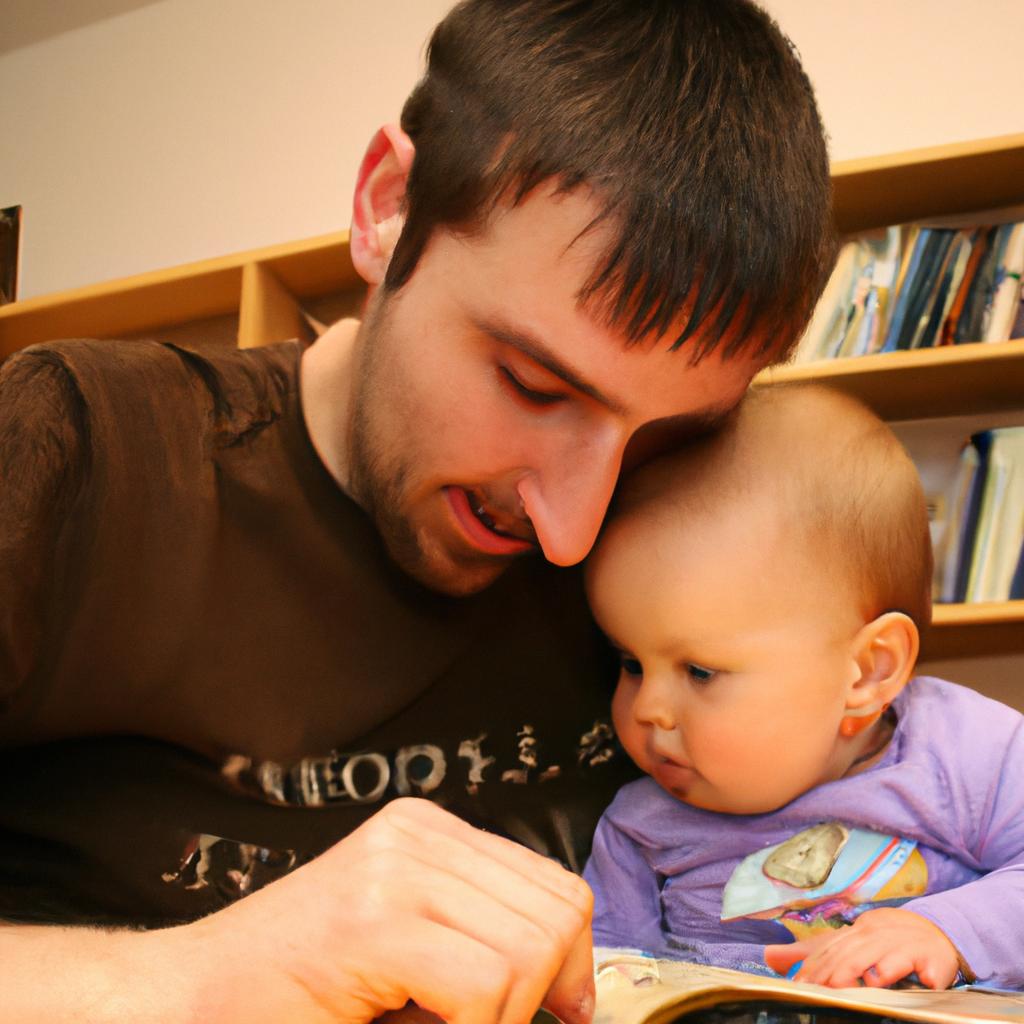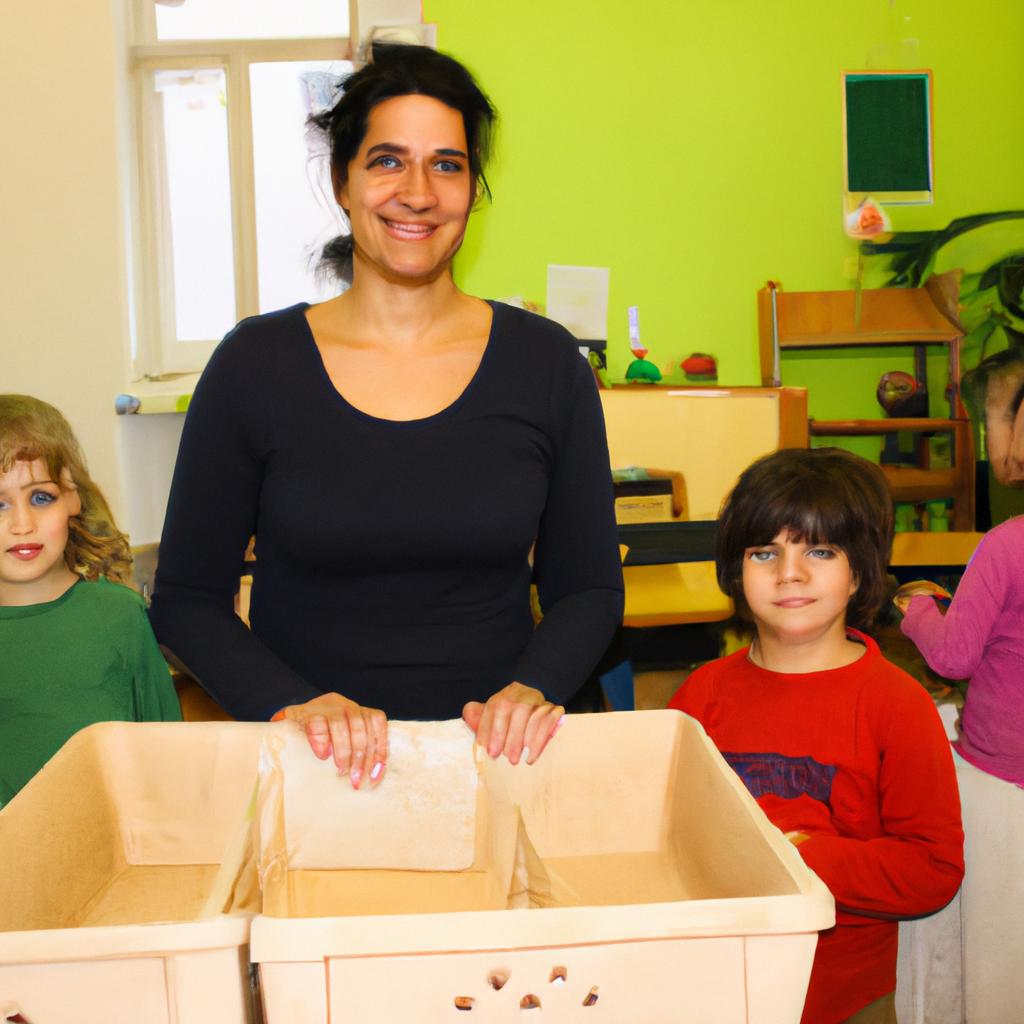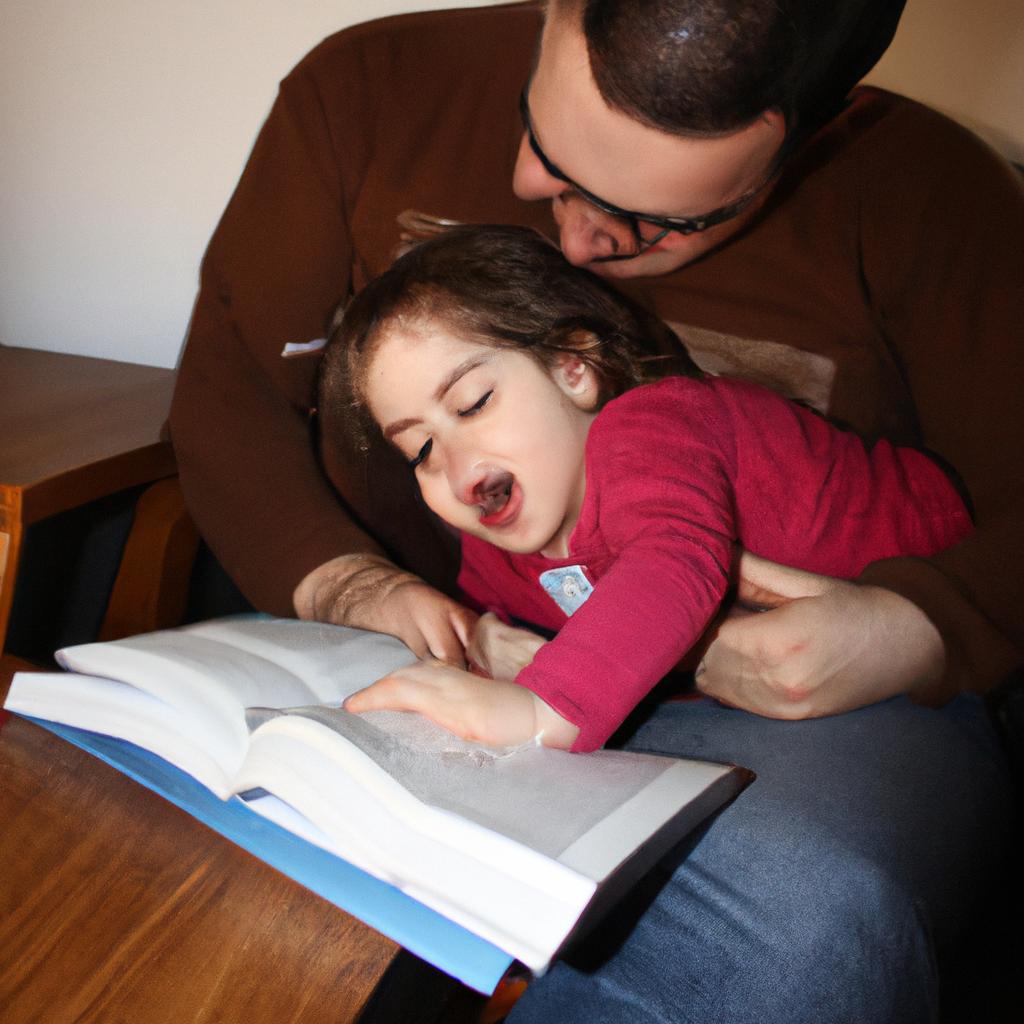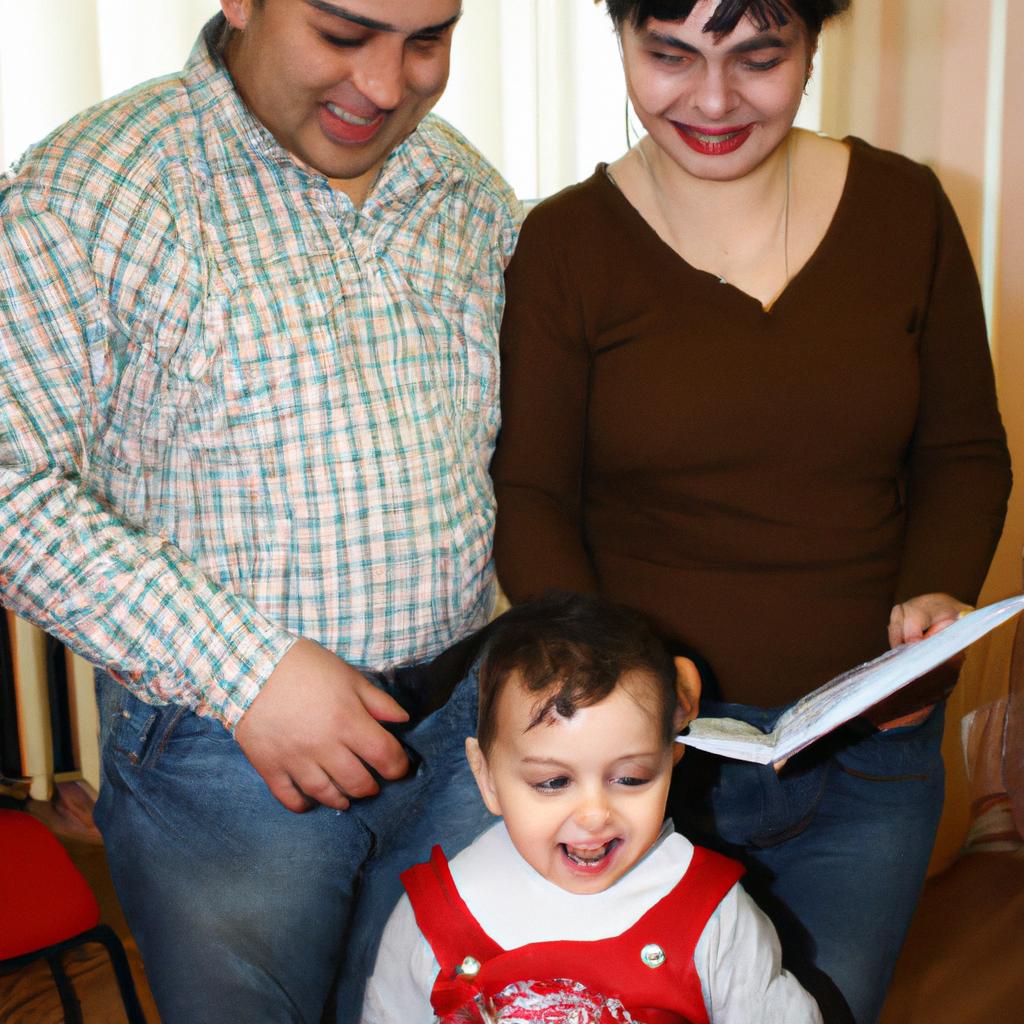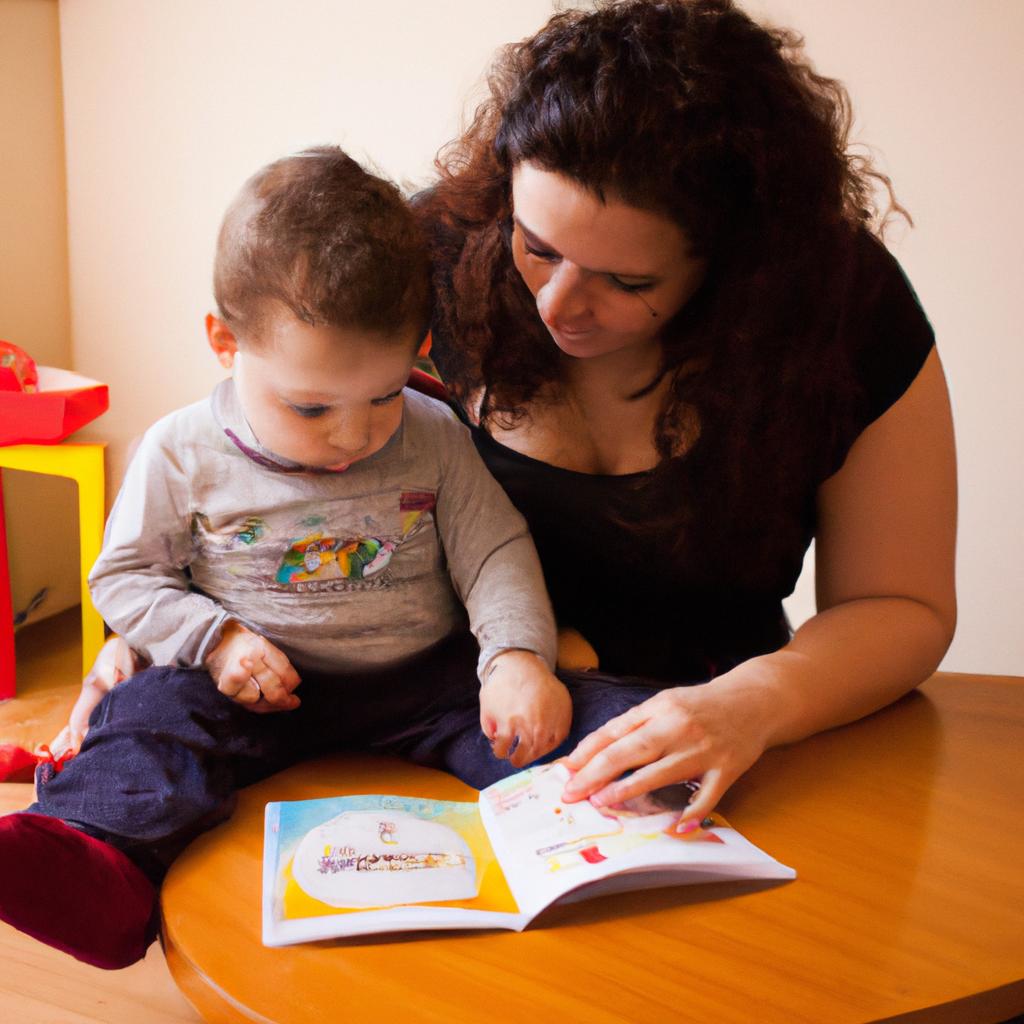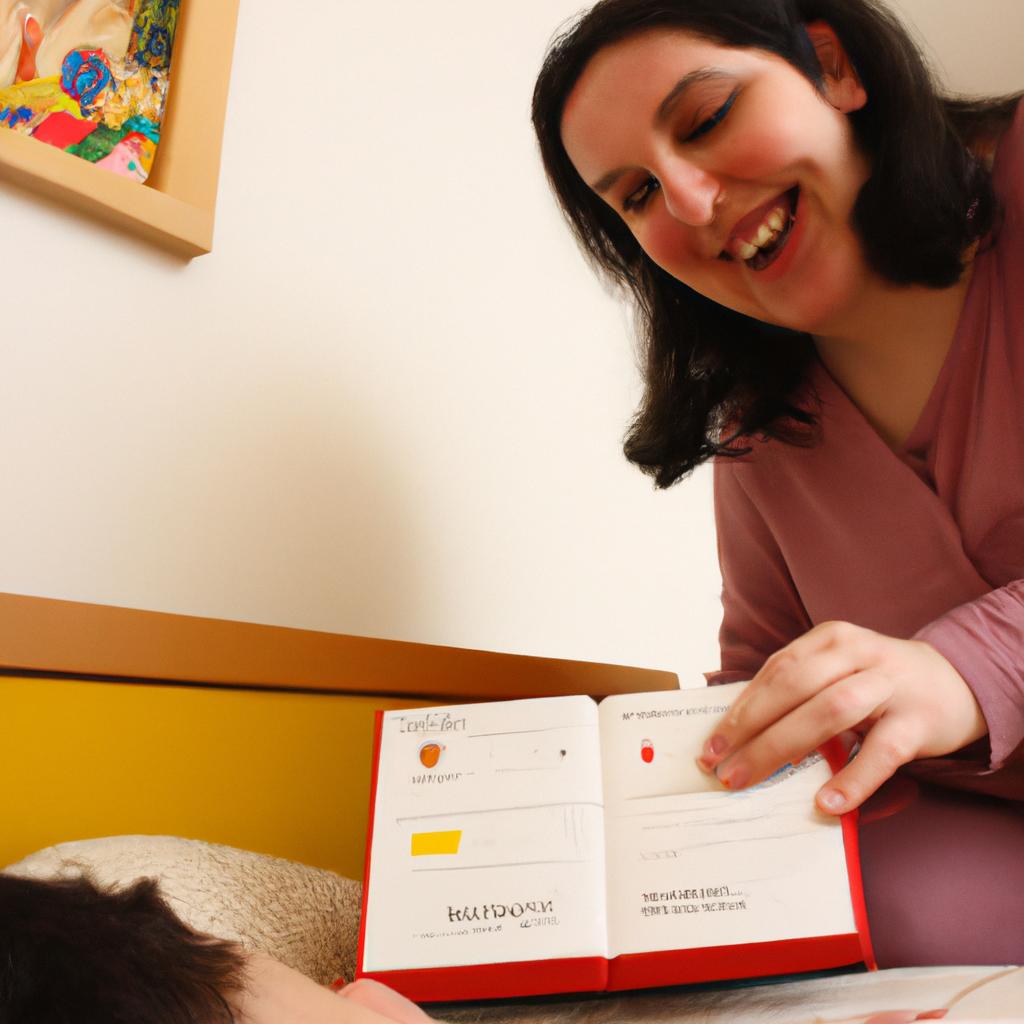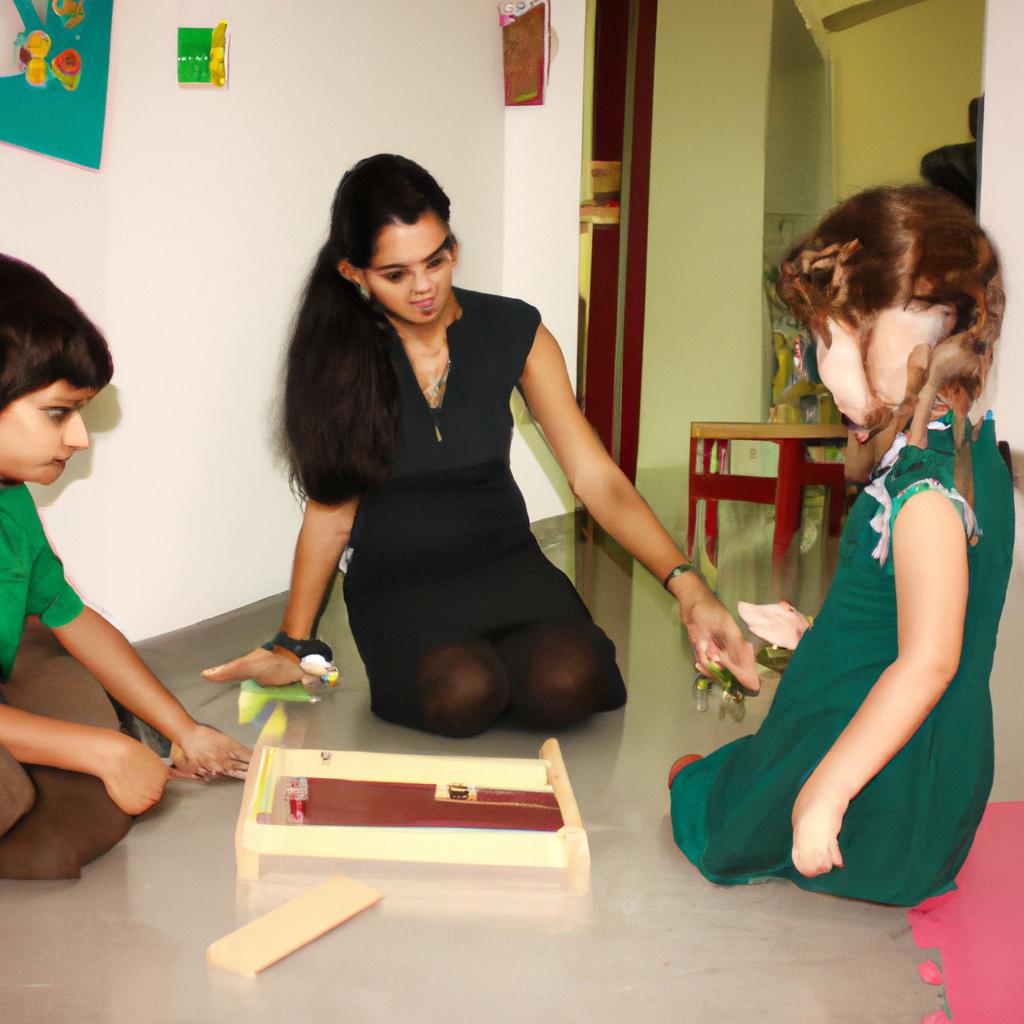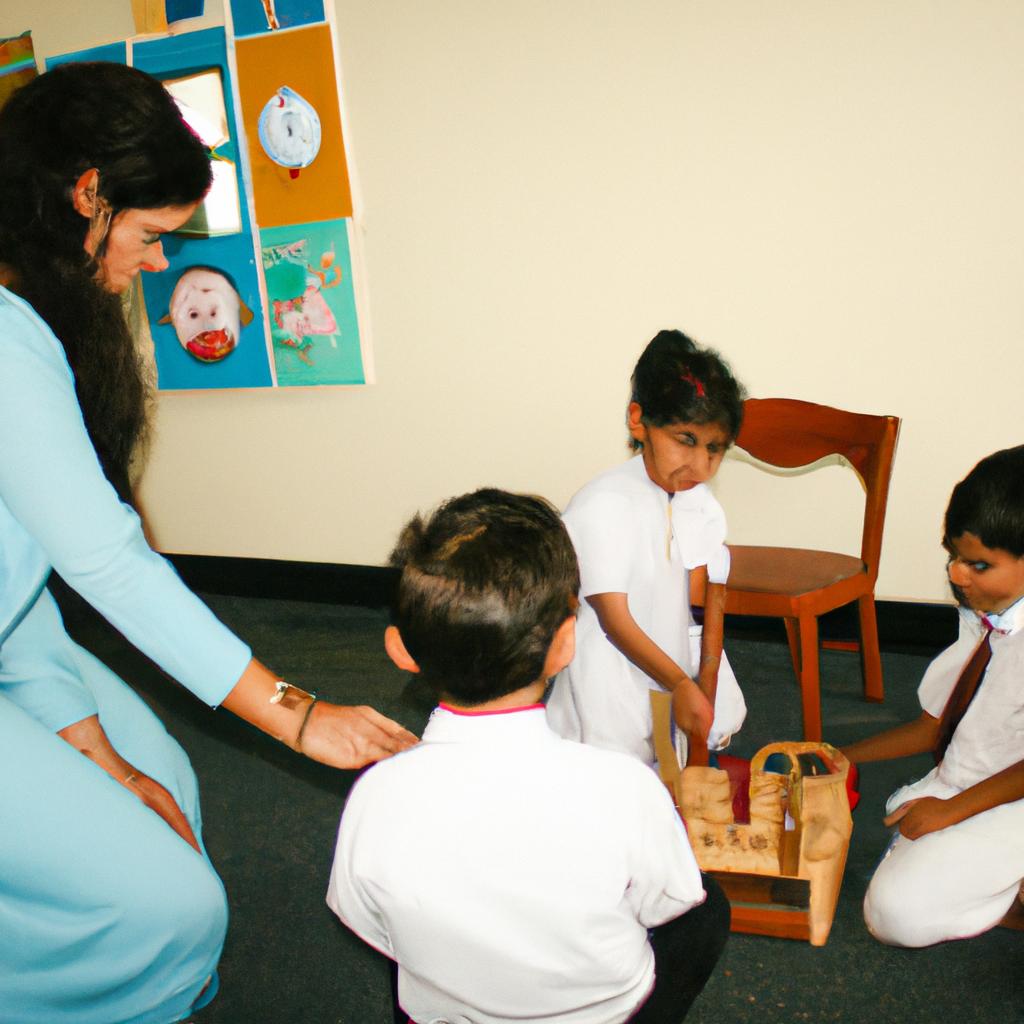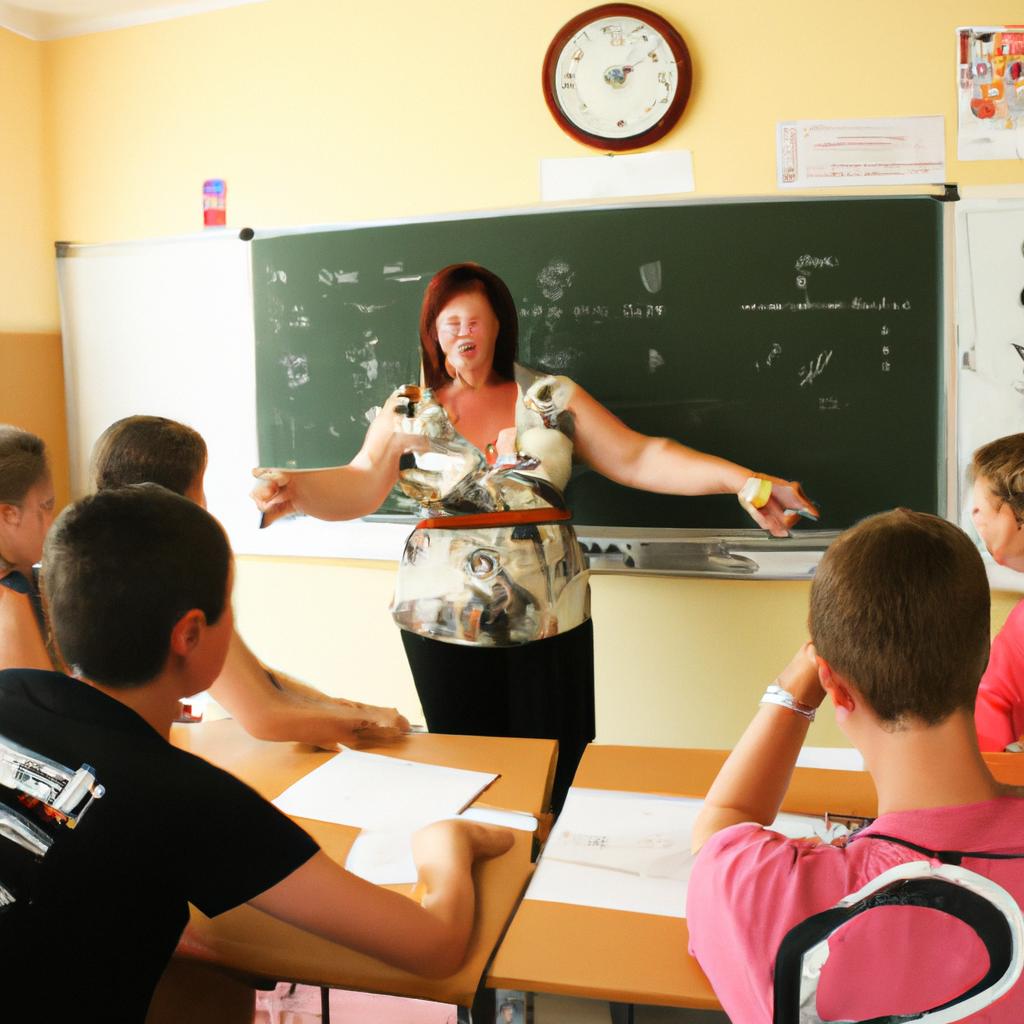Imagine a Montessori school where parents actively participate in their child’s education, thriving on the opportunity to learn and grow alongside their little ones. This vision becomes reality through parent education workshops, which serve as an essential avenue for enhancing parent involvement within the Montessori community. These workshops provide parents with valuable insights into the Montessori philosophy and methodology, equipping them with tools and strategies to support their children’s learning both at home and in the classroom.
For instance, consider a hypothetical case of Sarah, a parent attending a Montessori parent education workshop for the first time. Prior to this experience, Sarah had limited knowledge about the principles underlying her child’s education. However, during the workshop sessions led by experienced educators, she gained a deeper understanding of how Montessori practices promote independence, self-discipline, and love for learning. Armed with this newfound knowledge, Sarah was able to apply Montessori principles at home by creating a prepared environment that fostered her child’s natural curiosity and encouraged independent exploration.
Parent education workshops play a pivotal role not only in empowering individual parents like Sarah but also in strengthening the overall sense of community within Montessori schools. By fostering collaboration between parents and educators, these workshops create an inclusive space where ideas can be shared, experiences can be exchanged, and collective growth can occur. Parents have the opportunity to connect with other like-minded individuals who are also invested in their child’s education, forming a supportive network that extends beyond the workshop sessions.
Furthermore, parent education workshops provide a platform for parents to voice their questions, concerns, and insights about their child’s development and learning journey. Through open discussions and interactive activities, parents can gain valuable perspectives from both educators and fellow parents, allowing them to broaden their understanding of different approaches to parenting and education.
In addition to knowledge sharing, these workshops often include hands-on demonstrations and practical exercises that allow parents to actively engage with Montessori materials and techniques. This experiential learning approach enables parents to develop a deeper appreciation for the purpose behind each material and how it supports specific areas of their child’s development.
By actively involving parents in their child’s educational journey through these workshops, Montessori schools create a cohesive partnership between home and school environments. This collaboration enhances communication channels between parents and educators while fostering a sense of shared responsibility for the child’s holistic growth.
In conclusion, parent education workshops within Montessori schools play an instrumental role in promoting parental involvement and engagement in their child’s education. They serve as platforms for knowledge sharing, community building, collaboration, and experiential learning. Through these workshops, parents like Sarah can not only enhance their own understanding of Montessori principles but also actively contribute towards creating an enriching environment that nurtures their child’s love for learning.
Benefits of Parent Education Workshops
Parent involvement is essential for the success of a Montessori school and its students. One effective way to enhance parent involvement is through parent education workshops. These workshops provide parents with valuable knowledge, skills, and resources that can positively impact their child’s learning experience. In this section, we will explore the benefits of parent education workshops.
Engaging Example:
Consider Sarah, a parent who recently enrolled her child in a Montessori school. Although she was initially excited about this educational approach, Sarah felt unsure about how she could support her child’s learning at home. Attending a parent education workshop provided by the school changed everything for her. She learned practical strategies to create an enriching environment at home and gained confidence in supporting her child’s development.
- Foster a strong partnership between parents and educators
- Enhance parents’ understanding of the Montessori philosophy and approach
- Equip parents with practical tools to implement Montessori principles at home
- Create a supportive network among parents
| Benefits | Description |
|---|---|
| Improved Communication | Parents gain insights on effective communication techniques |
| Enhanced Academic Support | Strategies are shared to help reinforce classroom lessons at home |
| Increased Student Motivation | Parents learn ways to motivate their children towards independent learning |
| Strengthened Home-School Connection | Collaborative activities foster stronger relationships between teachers and parents |
Transition into Next Section:
By recognizing the multitude of benefits offered by parent education workshops, it becomes evident why these initiatives hold such significance within the context of Montessori schools. With a solid foundation established regarding their importance, let us now delve deeper into the specific topics covered in these engaging sessions.
Topics Covered in Parent Education Workshops
Enhancing Montessori School’s Parent Involvement through Education Workshops
Case Study: Sarah, a parent of two children attending a Montessori school, felt disconnected from her children’s education. She wanted to be more involved but didn’t know how best to support their learning at home. Upon hearing about the Parent Education Workshops offered by the school, she decided to attend one. Through these workshops, Sarah gained valuable insights into the Montessori method and learned strategies for fostering independence and self-directed learning in her children.
Parent Education Workshops aim to empower parents with knowledge and tools that enable them to actively participate in their children’s educational journey. These workshops cover a wide range of topics relevant to both the Montessori philosophy as well as general parenting skills. By providing parents with an understanding of the principles behind the curriculum and teaching methods used in Montessori schools, they can better align their approach at home with what is being taught in the classroom.
During these workshops, participants engage in discussions facilitated by experienced educators who guide them through various aspects of child development and effective parenting techniques within the context of Montessori education. The format encourages active participation, where parents are encouraged to share their experiences and learn from each other.
The benefits of attending Parent Education Workshops extend beyond just acquiring knowledge; they also foster a sense of community among parents. Here are some emotional responses commonly observed amongst attendees:
- Confidence: Parents gain confidence in their ability to support their child’s learning.
- Connection: Attending workshops allows parents to connect with like-minded individuals facing similar challenges.
- Empowerment: Equipped with practical strategies, parents feel empowered to create supportive environments for their children.
- Satisfaction: Seeing positive changes in their child’s behavior or academic progress brings immense satisfaction.
To further illustrate the impact of these workshops on parent involvement and student success, consider this hypothetical scenario:
| Workshop Topic | Example Strategy | Emotional Response |
|---|---|---|
| Encouraging Independence | Creating a child-friendly environment that promotes self-care tasks such as dressing and feeding themselves. | Empowerment |
| Nurturing Concentration | Implementing mindfulness exercises in daily routines to enhance focus and attention span. | Satisfaction |
| Supporting Language Development | Engaging children in conversations by asking open-ended questions and providing rich language experiences. | Connection |
| Promoting Practical Life Skills | Encouraging children to participate in household chores, fostering responsibility and independence. | Confidence |
By participating in these workshops, parents gain valuable insights into practical strategies they can implement at home to support their child’s learning journey. This section has explored the benefits of Parent Education Workshops and how they foster community involvement among parents. In the subsequent section on the Importance of Parent Involvement in Education, we will delve deeper into why active parental engagement is crucial for student success.
Importance of Parent Involvement in Education
Enhancing Montessori School’s Parent Involvement: Importance of Parent Education Workshops
Research has consistently shown that parent involvement in education is crucial for a child’s academic success. To enhance the level of parental engagement at Montessori schools, conducting parent education workshops can be an effective strategy. These workshops provide parents with valuable information and resources to better understand their child’s educational journey and how they can actively contribute to their development. By fostering a strong partnership between parents and educators, these workshops create a supportive environment where children can thrive.
To illustrate the impact of such workshops, let us consider an example. Imagine a parent named Sarah who attends a Montessori school workshop on “Supporting Your Child’s Emotional Development.” During the workshop, Sarah learns about various strategies to help her child regulate emotions effectively. She gains insights into recognizing different emotional states in her child and understanding their triggers. Armed with this knowledge, Sarah starts implementing the recommended techniques at home, which leads to improved emotional well-being and reduced behavioral issues in her child.
Parent education workshops cover a wide range of topics relevant to both early childhood development and specific aspects of the Montessori philosophy. Some common themes addressed in these workshops include:
- Understanding the principles of Montessori education
- Nurturing independence in young learners
- Creating an enriching learning environment at home
- Supporting social-emotional growth
These topics not only empower parents with practical tools but also foster a sense of community among families within the Montessori school setting.
Furthermore, incorporating interactive elements like bullet point lists helps evoke an emotional response from participants during parent education workshops. Consider the following list:
- Discover new ways to connect with your child’s unique learning style.
- Learn strategies for creating a positive homework routine together.
- Gain insights into promoting resilience and problem-solving skills.
- Explore methods for supporting creativity and imagination development.
Additionally, using tables provides organized information that can be easily referenced. Here is an example table highlighting the benefits of parent education workshops:
| Benefits of Parent Education Workshops |
|---|
| Increased parental involvement |
| Enhanced understanding of Montessori philosophy and approach |
| Improved collaboration between parents and educators |
| Empowered parents equipped with effective strategies |
In conclusion, parent education workshops play a vital role in enhancing parent involvement at Montessori schools. These workshops provide valuable information, foster a sense of community, and equip parents with tools to actively contribute to their child’s educational journey. By promoting open communication and collaborative efforts between parents and educators, these workshops create a supportive environment where children can thrive academically, emotionally, and socially.
Transitioning into the subsequent section about “Strategies for Effective Parent Communication,” it is important to recognize that ongoing communication between parents and educators further strengthens the partnership necessary for optimal student success.
Strategies for Effective Parent Communication
Enhancing Montessori School’s Parent Involvement through Parent Education Workshops
Transitioning from the importance of parent involvement in education, it becomes evident that implementing strategies for effective communication between schools and parents is crucial. By establishing a strong partnership between educators and families, Montessori schools can create an environment that fosters student success. One example of this is a case study conducted at Sunshine Montessori School, where they implemented a series of parent education workshops aimed at enhancing parental involvement.
To ensure successful implementation of these workshops, several strategies proved to be effective:
-
Clear Communication Channels: Establishing clear lines of communication between the school and parents is essential. This includes providing multiple avenues for contact such as email, phone calls, or online platforms like parent portals. Additionally, regular newsletters or updates can keep parents informed about upcoming events and opportunities for involvement.
-
Tailored Workshop Topics: Offering workshops on various topics relevant to parenting challenges allows parents to gain valuable insights into their child’s development and learning process. Workshops could cover subjects like fostering independence, supporting social-emotional growth, or promoting self-regulation skills.
-
Interactive Sessions: Engaging parents in interactive sessions during the workshops creates an opportunity for active participation and collaboration with other parents and teachers. These sessions may include hands-on activities related to Montessori principles or group discussions to share experiences and learn from one another.
-
Ongoing Support: Providing ongoing support beyond workshop sessions ensures that parents continue to receive guidance even after the initial training ends. This can involve follow-up meetings with individual families or creating online communities where parents can connect with each other and seek advice from educators.
By incorporating these strategies into parent education workshops, Montessori schools have witnessed positive outcomes in terms of increased parental involvement and improved student performance.
Moving forward, let us explore tips for creating a supportive home environment that complements the efforts made within the school setting without directly stating “step”.
Tips for Creating a Supportive Home Environment
To illustrate these concepts, let us consider an example of how a family successfully implemented such practices.
Example: The Johnson family consists of working parents, Sarah and Mark, and their two children attending a Montessori school. Despite their busy schedules, they aim to establish an enriching home environment that reinforces their children’s learning experiences at school.
Creating a Supportive Home Environment:
- Establish Consistent Routines:
- Set regular meal times, bedtimes, and study periods to provide structure.
- Encourage independence by involving children in planning daily routines.
- Foster Open Communication:
- Create opportunities for family discussions about school activities and challenges.
- Active listening allows parents to understand their child’s perspective better.
- Provide Accessible Learning Resources:
- Designate an area where children can explore educational materials freely.
- Stock the space with age-appropriate books, puzzles, and art supplies.
- Promote Healthy Habits:
- Encourage nutritious eating habits through meal planning together as a family.
- Allocate time for physical activity or outdoor play regularly.
Table – Emotional Response Elicitation:
| Positive Outcomes | Benefits |
|---|---|
| Enhanced Parent-child Bond | Strengthened relationships between parents and children |
| Improved Academic Performance | Increased motivation and engagement in studies |
| Cultivation of Independence | Development of self-reliance skills |
| Holistic Growth | Well-rounded personal development |
In conclusion, implementing these strategies within the home environment fosters collaboration between parents and educators while nurturing positive growth among Montessori students. By establishing consistent routines, promoting open communication, providing accessible resources, and encouraging healthy habits, families like the Johnsons ensure that learning extends beyond the classroom walls.
Understanding how parent education workshops enhance Montessori education, we will now explore the ways in which these workshops further strengthen the bond between parents and educators.
How Parent Education Workshops Enhance Montessori Education
Building upon the importance of creating a supportive home environment, parent education workshops offer valuable insights and strategies to enhance Montessori education. These workshops provide parents with the necessary tools to actively engage in their child’s learning journey and foster a harmonious partnership between home and school.
Parent Education Workshop Example:
Imagine a scenario where a parent attends an educational workshop focused on practical life skills development in Montessori classrooms. During this workshop, they learn about the significance of fostering independence in their child by encouraging them to participate in daily activities such as setting the table or folding clothes. Armed with this knowledge, the parent starts implementing these practices at home, providing opportunities for their child to develop essential life skills while simultaneously reinforcing what is being taught at school.
- Gain insight into Montessori principles and philosophy.
- Acquire practical strategies to support their child’s learning and development.
- Establish effective communication channels between home and school.
- Connect with other parents who share similar goals and challenges.
| Benefits of Parent Education Workshops |
|---|
| Enhanced understanding of Montessori principles |
| Improved support for children’s learning |
| Strengthened collaboration between home and school |
| Increased sense of community among parents |
Incorporating these bullet points within interactive workshops not only imparts important knowledge but also taps into the emotional aspect of parenting. By offering real-life examples, engaging discussions, and hands-on activities, these workshops evoke a deep sense of connection among participants.
As parents become more involved through these workshops, they can better understand how various aspects of the Montessori approach contribute to their child’s holistic development. This newfound knowledge empowers parents to create an environment that aligns seamlessly with classroom teachings, thereby enhancing their child’s overall educational experience.
By actively participating in parent education workshops, parents are equipped with valuable resources that allow them to support their child’s learning journey effectively. This collaborative effort between parents and educators not only strengthens the Montessori community but also fosters a deeper understanding of each child’s unique needs, ensuring they receive the best possible education both at home and in school.

